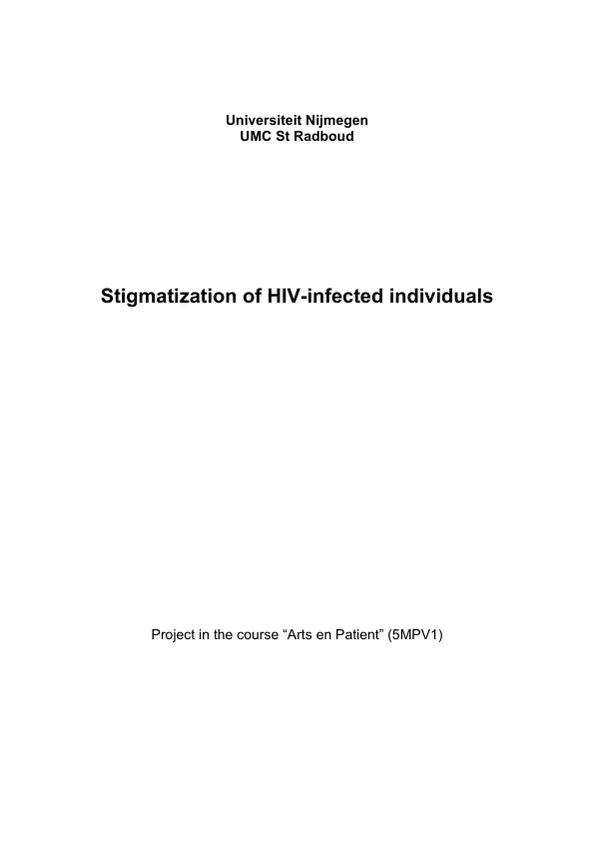This review paper is intended to summarize and discuss the causes as well as the consequences of stigmatization as a response to AIDS / HIV. In the beginning, focus will be on the influence of the community, reflecting the sociological perspective of the problem. Secondly, the impact on the infected individual is approached, which poses the psychological part. Extensive research has been carried out on this sociologically and psychologically highly challenging matter and there is consensus that action is required to eradicate stigmatization.
Inhaltsverzeichnis (Table of Contents)
- Introduction:
- Stigmatization...
- Social consequences of stigmatization.
- What can be done against stigma?
- Impact on the individual.
- Coping strategies:.
- Internalized stigma
- Stress.
- Depression.....
- A patient's perspetive.
- Evaluation....
Zielsetzung und Themenschwerpunkte (Objectives and Key Themes)
This review paper aims to analyze and discuss the causes and consequences of stigmatization as a response to AIDS/HIV. The paper explores the sociological perspective of the problem, focusing on the influence of the community, and then delves into the psychological impact on infected individuals. The paper examines extensive research on this complex topic, highlighting the consensus that action is needed to eradicate stigmatization.
- The sociological and psychological effects of HIV/AIDS stigmatization.
- The impact of community attitudes and social norms on HIV/AIDS stigma.
- The individual's experience of stigma, including fear, shame, and stress.
- Strategies for reducing HIV/AIDS-related stigma at both the individual and societal levels.
- The influence of time and generational perspectives on stigmatization.
Zusammenfassung der Kapitel (Chapter Summaries)
- Introduction: This chapter provides an overview of the review paper's objectives and scope, emphasizing the need to address stigmatization associated with AIDS/HIV. It highlights the sociological and psychological aspects of the problem and the importance of research in finding solutions.
- Stigmatization: This chapter defines stigmatization in relation to AIDS/HIV, highlighting the cultural and social contexts that contribute to it. It discusses the concepts of enacted and felt stigma, emphasizing the latter's significance in shaping the experiences of HIV-infected individuals.
- Social consequences of stigmatization: This chapter explores the wide-ranging negative consequences of stigmatization on individuals living with HIV, including limited access to testing, social isolation, employment discrimination, and restricted access to healthcare.
- What can be done against stigma?: This chapter examines strategies for reducing HIV-related stigma, emphasizing the need for societal change and individual empowerment. It discusses the potential role of time and generational perspectives in shaping attitudes towards HIV/AIDS.
- Impact on the individual: This chapter explores the individual's experience of stigma, outlining four stages of the HIV/AIDS illness course and the unique challenges associated with each stage.
Schlüsselwörter (Keywords)
The main keywords and focus topics of this text include: AIDS/HIV, stigmatization, enacted stigma, felt stigma, social consequences, community attitudes, individual experience, coping strategies, generational perspectives, and strategies for reducing stigma.
Frequently Asked Questions
What are the causes of HIV/AIDS stigmatization?
Stigmatization is often caused by fear of infection, lack of knowledge, and cultural or moral judgments associated with the modes of transmission.
What is the difference between enacted and felt stigma?
Enacted stigma refers to actual experiences of discrimination or prejudice. Felt stigma (or perceived stigma) is the fear of being discriminated against and the internalization of negative social attitudes.
How does stigmatization impact the individual?
Stigma can lead to severe psychological issues such as depression, chronic stress, and a sense of isolation. It may also prevent individuals from seeking medical testing or treatment.
What are the social consequences of HIV stigma?
Social consequences include employment discrimination, loss of social support networks, and restricted access to healthcare and community resources.
What can be done to reduce HIV-related stigma?
Effective strategies include public education campaigns, legal protections against discrimination, and empowering infected individuals through support groups and advocacy.
- Quote paper
- Anonym (Author), 2006, Stigmatization of HIV-infected individuals, Munich, GRIN Verlag, https://www.grin.com/document/67078



